 | |  |
 |
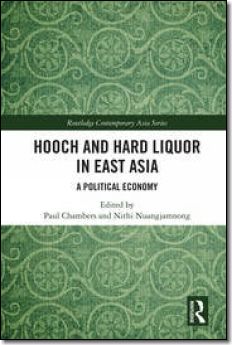
| The Political Economy of Hooch and Hard Liquor in Taiwan: From Inexpensive Chinese Liquor to Indigenous Kaoliang and World-Class Whisky
In: Hooch and Hard Liquor in East Asia: A Political Economy (Routledge), 2025.
The production of alcoholic beverages flourished in Taiwan at the end of the nineteenth century, when large numbers of migrants from China settled in Taiwan. Under Japanese colonial rule (1895-1945), the production, distribution, and sale of alcoholic beverages were monopolized. The monopoly transformed domestic liquor production from being a folk tradition and a sideline business of agriculture into an industry of its own. More importantly, it led to substantial increases in production capacities and efficiency. The monopoly also played an important role in Japan's military and economic ambitions in East and Southeast Asia. After World War II, the authoritarian Kuomintang (KMT) government continued the state monopoly primarily for revenue extraction thus placing less emphasis on innovation. Democratization, globalization, and Taiwan's entry into the World Trade Organization contributed to fundamental changes in the hard liquor industry, such as the indigenous production of world-class whisky, sorghum liquor, and the evolution of an indigenous craft liquor industry. This chapter investigates the roles of different stakeholders (i.e., the state, entrepreneurs, society at large, and foreign actors) and their underlying motives in terms of prohibiting, producing, promoting, and consuming moonshine-type beverages as well as other sorts of liquor throughout different evolutionary stages.
Link to publication
| |
 |
 | |  |
 | |  |
 |

| The Influence of Social Media Marketing on Voting Intention in Indonesia
Journal of Political Marketing, 2024 (ESCI, Scopus)
In this paper, my colleagues and I analyse the impact of social media marketing (SMM) on voting intention (VI) and the mediating effect of electronic word-of-mouth (eWOM), Candidate's image (CI), and religious beliefs (RB) in Indonesia. We applied Structural Equation Modeling (SEM) and bootstrapping methods to examine the study's data. The study hypothesized that SMM, eWOM, CI, and RB have a significant positive effect on VI. Our findings show that eWOM, CI, and RB partially mediate the relationship between SMM and VI. Our research affords better comprehension of the critical issues influencing Indonesian voters to vote for any candidate or party that SMM influences.
Link to publication
Free download of paper
| |
 |
 | |  |
 | |  |
 |
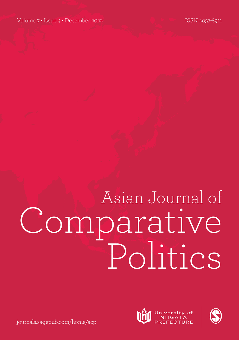
| Political dynasties and democratization: A case study of Taiwan
Asian Journal of Comparative Politics, 2023 (ESCI, Scopus)
Political families in transitional societies are often seen in the context of corruption, democratic regression, deterioration of socio-economic development, inequality, and deprivation. High levels of dynasticism, however, also exist in advanced democratic societies. Using the example of Taiwan, this article explores the factors behind the evolution of electoral dynasties and how the behavior of hereditary politicians has been conditioned by democratization. More specifically, the article argues that legacy politicians are not per se the Pandora's box of low-quality politics. Rather, they act like other networks of personal relations. As such, self-imposed ethical standards and inherited cultural norms may substantially restrain the intrinsic particularistic potentials of such networks, but in the long run only political modernization can prevent them from cultivating political capitalism - the predatory use of public resources. That is, political modernization conditions the behavior of electoral dynasties. It transforms particularistic networks into more progressive and programmatic forms of dynasticism.
Link to publication
Free download of paper
A video presentation of the paper is available here.
Transcript of the presentation in PDF.
| |
 |
 | |  |
 | |  |
 |
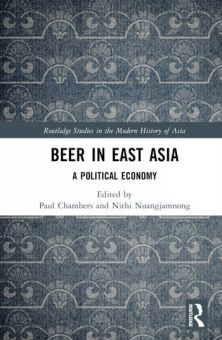
| The political economy of beer in Taiwan: From Japanese pride to national brouhaha, beer wars and craft beer
In: Beer in East Asia: A Political Economy (Routledge), 2023.
Originally intended to boost the morale of Japanese officials in colonial Taiwan (1895-1945), beer soon became popular with the local population. Since the first commercial mass production of beer at the beginning of the twentieth century, the Taiwanese beer industry has undergone manifold changes, leading to diversified and highly consumer-oriented markets with significant growth potential. Apart from the Japanese colonial era, there have been other critical junctures in its development. More specifically, the Kuomintang (KMT) government retreated to Taiwan and expanded the beer production after the lost civil war in China. Moreover, innovative entrepreneurs and an increasingly affluent society fascinated by Western culture brought about the proliferation of the American "Old West" beerhouse in the 1980s. Growing popular demand for political liberalization further contributed to this new but disputed social phenomenon. Finally, democratization, globalization, Taiwan's entry into the World Trade Organization, and tensions with neighboring China paved the way for further fundamental changes in the Taiwanese beer industry. This chapter investigates the roles of different stakeholders (i.e., the state, entrepreneurs, society at large, and foreign actors) and their underlying motives in terms of prohibiting, producing, promoting, and consuming beer throughout different evolutionary stages.
Link to publication
A video presentation of my book chapter is available here.
Transcript of the presentation in PDF.
| |
 |
 | |  |
 | |  |
 |
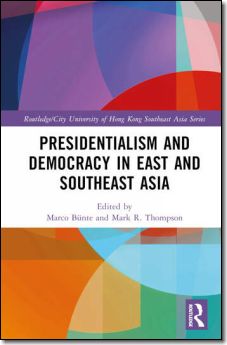
| Taiwan: The Limited but Beneficial Role of Semi-presidentialism
In: Presidentialism and Democracy in East and Southeast Asia (Routledge), 2022.
Since the retreat of the Kuomintang (KMT) government to Taiwan in 1949, the Republican Chinese constitution enacted in 1947 has served as the prime legal foundation of the de facto independent Taiwanese state. Resembling the Weimar constitution, Taiwan's semi-presidential form of government consists of a parliamentary system with a president mandated to fulfil the role of a political adjudicator between the legislative and executive branches of government. Despite theoretical discussions in the literature about the potential instability of semi-presidential systems in changing societies, Taiwan has progressed towards a consolidated democracy without any record of severe political turmoil or abrupt breakdown of democratic rule since the lifting of martial law in 1987. National identification, historical antagonisms between China and Taiwan, and Taiwan's quest for international recognition constitute the very source/force of Taiwanese democracy and explain its stability. In other words, the form of government has not per se been a determining factor in Taiwan's democratic success story. Rather, it has served as a means (regardless of its specific characteristics) within a broader socio-political framework to contest opposing political hegemonies.
Link to publication
PDF of book chapter
| |
 |
 | |  |
Economic Studies - Operations Management
|
 | |  |
 |

| Effect of Culture Period and Stocking Density on Input Demand and Scale Economies of Milkfish (Chanos chanos) Polycultures with White Shrimp (Penaeus indicus)
Fishes, 2022 (SCIE, Scopus, Impact Factor: 2.4)
Milkfish, Chanos chanos, is one of the major inland cultured fish species in Taiwan. Variations in land resources and climate have led to the application of two distinct culture practices of milkfish polycultures with white shrimp, Penaeus indicus. This study applies a translog cost function model to analyze the production scale economy and input demand price elasticity of four milkfish polyculture systems with two different culture periods (OWC and NOWC) and two different white shrimp¡Vmilkfish fry stocking ratios (low SMR: 10¡V55 fry/ha; high SMR: 56¡V100 fry/ha). The findings show that the four milkfish polyculture systems require different operational adjustments to increase production while reducing the average culture cost. More specifically, overwinter cultures (OWC) have economies of scale. Farmers may reduce the average cost by expanding the production scale. Non-overwinter polycultures (NOWC) with high SMR are at the stage of decreasing return to scale, meaning that gains in output of milkfish cannot reduce the average cost. In terms of input factor use, farmers of OWC systems with high SMR are sensitive to fluctuations in the fry price since fry constitutes the input factor exhibiting the highest own-price elasticity. Moreover, fry and feed of OWC households with high SMR have high levels of substitutability, whereas fry and other input exhibit substitutability in OWC systems with low SMR. In NOWC farming households with high SMR, fry and capital have substitutability. It is thus recommended to modify the input factor use according to the culture mode and the white shrimp¡Vmilkfish stocking density ratio. Moreover, the study found that NOWCs have considerably higher SMR than OWCs, which may lead to a deterioration of the water quality in NOWC fishponds and lower survival rates. It is thus recommended to reduce the SMR to 31:1 to achieve economies of scale in production and increase the survival rate of milkfish and white shrimp.
Link to publication
| 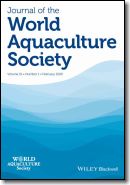
| A production economic analysis of different stocking density and fry size combinations of milkfish, Chanos chanos, farming in Taiwan
Journal of the World Aquaculture Society, 2021 (SCI, Scopus)
Milkfish, Chanos chanos, is often cultured with white shrimp, Penaeus indicus, to maintain ecological stability and increase profits. This study uses the outputs and cost data of 169 milkfish farmers in Taiwan for the years 2018 and 2019 and applies translog cost function modeling to analyze the production scale economy and input–input demand combinations of two stocking densities and two fry stocking sizes. The study found that high-density stocking of small or large milkfish fry has economies of scale overall. Thus, the average culture cost may be reduced by expanding the scale of milkfish production. High-density stocking of small fry exhibits a comparatively higher own-price elasticity of fry. As such, farmers are sensitive to fry price variations. The study also found that labor and capital exhibit the highest substitutability. Capital inputs may thus be increased to mitigate the effects of wage increments. In terms of production, the four observed clusters do not exhibit cost complementarity. Moreover, the survival rate of white shrimp in high-density stocking milkfish polycultures is relatively low. It is thus recommended to strictly control the stocking density of white shrimp and to minimize the risk of excessively high stocking densities by stocking white shrimp in batches.
PDF of publication
|
| |
 |
 | |  |
|























































































































































































